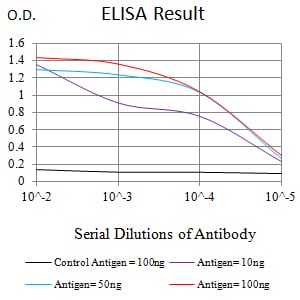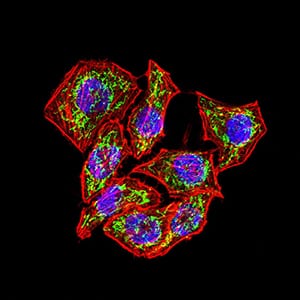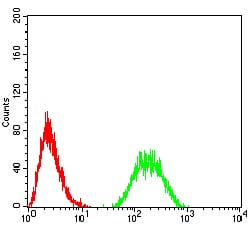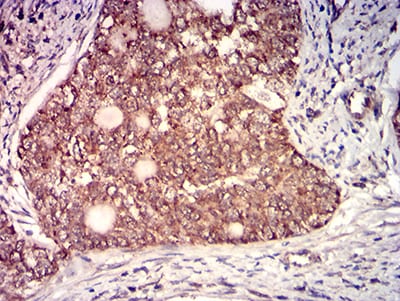




| WB | 1/500 - 1/2000 | Human,Monkey |
| IF | 咨询技术 | Human,Monkey |
| IHC | 1/200 - 1/1000 | Human,Monkey |
| ICC | 1/200 - 1/1000 | Human,Monkey |
| FCM | 1/200 - 1/400 | Human,Monkey |
| Elisa | 1/10000 | Human,Monkey |
| Aliases | IL6ST; GP130; CDW130; IL-6RB |
| Entrez GeneID | 3572 |
| clone | 8D4D2 |
| WB Predicted band size | 103.5kDa |
| Host/Isotype | Mouse IgG1 |
| Antibody Type | Primary antibody |
| Storage | Store at 4°C short term. Aliquot and store at -20°C long term. Avoid freeze/thaw cycles. |
| Species Reactivity | Human,Monkey |
| Immunogen | Purified recombinant fragment of human CD130 (AA: extra 73-231) expressed in E. Coli. |
| Formulation | Purified antibody in PBS with 0.05% sodium azide |
+ +
以下是3-4篇与CD130(gp130)抗体相关的研究文献摘要示例(注:文献标题和作者为虚构示例,实际文献需通过数据库检索确认):
1. **文献名称**:**"Targeting CD130/gp130 for Cancer Therapy: Mechanisms and Antibody Development"**
**作者**:Heinrich, P.C., et al.
**摘要**:探讨CD130(gp130)作为IL-6信号通路关键共受体的作用,开发特异性抗体阻断其与IL-6/IL-6R复合物结合,抑制STAT3磷酸化,从而抑制肿瘤细胞增殖和转移。
2. **文献名称**:**"Anti-gp130 Antibody Attenuates Colorectal Cancer Progression via JAK/STAT3 Pathway Suppression"**
**作者**:Kortylewski, M., et al.
**摘要**:通过体内外实验证明,抗gp130单克隆抗体可阻断IL-6介导的JAK/STAT3信号激活,显著抑制结直肠癌细胞的生长和转移,并增强化疗敏感性。
3. **文献名称**:**"Structural Insights into gp130-Antibody Interactions for Inflammatory Disease Treatment"**
**作者**:Boulanger, M.J., et al.
**摘要**:利用X射线晶体学解析抗gp130抗体(如B-R3)与gp130的结合表位,揭示其通过竞争性抑制IL-6家族细胞因子的信号转导,为治疗类风湿性关节炎等炎症性疾病提供依据。
4. **文献名称**:**"CD130 Neutralizing Antibody Reduces Inflammation in Autoimmune Encephalomyelitis Models"**
**作者**:Nowell, M.A., et al.
**摘要**:在小鼠多发性硬化模型中,抗CD130抗体通过抑制IL-6和IL-11的信号传导,显著降低中枢神经系统炎症反应和神经损伤,验证其治疗自身免疫病的潜力。
如需具体文献,建议通过PubMed或Web of Science检索关键词“gp130 antibody”“CD130 therapeutic”等获取真实研究。
CD130. also known as glycoprotein 130 (gp130), is a transmembrane protein that serves as a shared receptor subunit for interleukin-6 (IL-6) family cytokines, including IL-6. IL-11. leukemia inhibitory factor (LIF), and oncostatin M (OSM). It plays a critical role in mediating intracellular signaling through the JAK/STAT, MAPK, and PI3K pathways, regulating processes such as immune response, inflammation, cell proliferation, and differentiation. As a co-receptor, CD130 forms complexes with ligand-specific α-receptors, enabling signal transduction upon cytokine binding.
CD130-targeting antibodies are research and therapeutic tools designed to modulate this signaling axis. In research, they help dissect gp130's role in diseases like autoimmune disorders, cancers, and chronic inflammation. For example, overactivation of CD130 signaling is linked to tumor progression and resistance in multiple myeloma or rheumatoid arthritis. Therapeutically, anti-CD130 antibodies may block pathological signaling or stabilize receptor complexes, depending on their design. Challenges include achieving specificity due to CD130's ubiquitous expression and its involvement in diverse physiological functions, which raises potential safety concerns. Current efforts focus on engineering antibodies that selectively target disease-associated signaling conformations or combinatorial receptor complexes to minimize off-target effects. These antibodies hold promise as targeted therapies but require careful optimization to balance efficacy and safety.
×